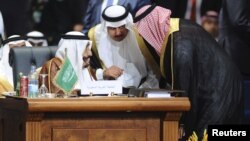As regional and global alliances shift, Saudi Arabia is shaking up its leadership — ensuring a clear line of succession with younger, more aggressive men hoping to expand the kingdom's regional power as the king nears his 80th birthday.
As Gulf leaders arrived in the Saudi capital, Riyadh, on Thursday to prepare for an upcoming summit in the United States, all eyes were on the Saudi royal family.
The aging king has named new, younger successors and replaced the longest-serving foreign minister anywhere, 75-year-old Saud al-Faisal.
Theodore Karasik, a Gulf-based geopolitical analyst and senior adviser to Gulf State Analytics, said this is a sign of a new era in Saudi policy-making, both foreign and domestic.
“The new Saudi leadership, as it begins to rise to the throne and make policy, this is going to be more robust, vocal and full of action," he said. "The Saudis have typically conducted their foreign and security policy in a very quiet way, with back channels and so on. I think we are going to see this new, younger leadership be more forthcoming.”
The appointments include the new crown prince — first in line for the throne - 55-year-old Interior Minister Mohammed bin Nayef, best known for his tough stance against al-Qaida.
Second in line for the throne is now the king’s son, Defense Minister Mohammed bin Salman, believed to be in his 30s, who is the face of the Saudi offensive in Yemen.
Also joining the top policy-makers is the new foreign minister, Adel al-Jubeir, who served as Saudi ambassador to the U.S.
Karasik said the young defense minister's appointment appears to be a prize for his handling of the Yemen invasion, which is clear evidence of evolving Saudi foreign policy.
“What we’ve seen in Yemen with the Saudi-led coalition is unthinkable, or was unthinkable up until it actually happened," he said "No one truly believed that Saudi Arabia would lead a coalition to attack another country.”
Tensions with Iran
Increasing tensions with Iran also are motivating policy shifts, said Karasik.
In the current world order, relations between Iran and Saudi Arabia are often viewed as a zero-sum game: if one is thought to be gaining influence, it's assumed the other must be losing it.
As Iran’s relationship with the West warms with a potential nuclear deal, the country appears to be gaining military and economic influence. And while no one expects an all-out war between Sunni-led Saudi Arabia and Shi'ite-dominated Iran, the two countries are already believed to be fighting proxy wars in Syria and Yemen.
Officially, Iran often denies there are tensions. In New York this week, Iranian Foreign Minister Mohammad Javad Zarif said his country has “good bilateral relations” with Saudi Arabia. If there is any problem, Zarif said, it comes from the Saudi side:
“We don’t see our threat, our interest in the region to be mutually exclusive," he said. "This is our perception. I certainly hope they [Saudis] have the same perception, because, as you say, I’m not a dancer but it takes two to tango.”
Saudi Arabia’s more aggressive position in the region could also cause unforeseen dangers, said Abdullah al-Ashaal, a former deputy foreign minister and ambassador in Egypt.
He said an increase in tensions with Iran could cause unrest among Saudi Shi'ite Muslims, a large minority that complains of systematic marginalization.
“The more Saudi Arabia is challenging Iran, the more the danger of the Shi'ites inside the population," he said. "Especially because they are discriminated against.”
The new line of succession could also change again if the rest of the royal family rejects the new leaders, he said.
More importantly, al-Ashaal added, Saudi Arabia is stretched thin militarily right now, fighting Shi'ite militants in Yemen and Islamic State militants in Iraq. If these wars drag on, or Saudi forces are forced to retreat, the country's bold new views could backfire.





